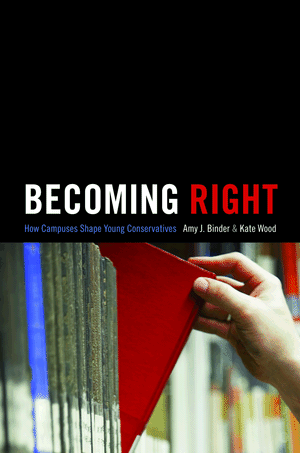book spotlight: becoming right by amy j binder and kate wood
 Becoming Right: How Campuses Shape Young Conservatives, by Amy Binder and Kate Wood, is the latest entry into the growing scholarship on conservative politics in America. They ask a simple question: how do campus environments shape conservative political styles? This is an important question for two reasons. First, there is relatively little research on conservative students. Second, culture depends on organizational environment. How ideas are expressed is affected by where ideas are expressed. Definitely a worthy question for a sociologists.
Becoming Right: How Campuses Shape Young Conservatives, by Amy Binder and Kate Wood, is the latest entry into the growing scholarship on conservative politics in America. They ask a simple question: how do campus environments shape conservative political styles? This is an important question for two reasons. First, there is relatively little research on conservative students. Second, culture depends on organizational environment. How ideas are expressed is affected by where ideas are expressed. Definitely a worthy question for a sociologists.
So what do Binder and Wood discover? They focus on two campuses for their case study – big public West Coast and fancy private East Coast. They choose these campuses because thay have similar high achieving student bodies but the environments are way, way different. West Coast is a huge “multiversity” to use Clark Kerr’s terminology. East Coast is smaller and more intimate. The same type of students tend to be attracted to campus conservative politics (mainly white, fairly comfortable folks) but the environments encourage different expressions.
You might say that there are two habituses at work – the provocateur and the intellectual. In a big impersonal campus, it is very, very hard to project your voice except in a confrontational manner. Thus, West Coast conservative students rely on sensational tactics, like the affirmative action bake sale. Also, West Coast students feel little attachment to the community. Little is lost by being aggressive. In contrast, East Coast encourages all students to feel as if they have a place, even if they admit that most professors are fairly liberal. They don’t feel alienated or embattled, so they feel little hostility toward the campus. Thus, they resort to more intellectual forms of expression that don’t rely on shocking people. The book also has a nice discussion of the larger field of conservative politics and how that affects campus protest.
Overall, a solid book and one that’s essential to studies of campus politics. If I were to criticize the book, I think I’d think a little more about the differences between conservative students and the broader field of conservative intellectuals. This does get mentioned in a few passages that allude to Steve Teles’ book on conservarive legal academia, which we discussed in detail on this blog. The issue is that the world of conservative intellectuals that have influence is more defined by the East Coast intellectual types than the affirmative action shock jocks at West Coast. The consequences are important as we’ve seen with the Tea Party mobilization. Conservative grass roots politics is now dominated by shock jocks, not the well coiffed policy wonks of the Heritage Foundation. More needs to be said about the boundary and links between campus conservatives and this broader network of think thanks, interest groups, and electoral organizations.
The last comment I’ll make is about the inherent irony of much of this stuff. It can be argued that conservative politics at its best is incremental, stodgy, and resistant to radicalism – that it is essentially bourgeois. It retains the hard won lessons of tradition and skepticism of utopia. Then there is some irony that the cultural style of contemporary conservatives is at odds with this ideal. It is loud and obnoxious. It mocks one of society’s most ancient and enduring institutions, the university system, which has nurtured Western culture since the end of the Middle ages. It is skeptical and hostile toward those who are cultured and knowledge. It can’t disentangle potentially insightful criticisms of specific intellectual currents from a loathing of the academic system itself. Perhaps the ultimat lesson is that beneath the talk of tradition and values, there is a rank populism that leaves one ultimately disappointed.
Adverts: From Black Power/Grad Skool Rulz
Thanks for bringing this into teh spotlight
I am dismayed that the only people arguing for fiscal conservatism are also the ones out to deprive sections of society the right to their body, or the right to marital unions. As a fiscal conservative (and ethnic minority) in a private engineering school, i feel i have no voice among the tyranny of several majorities.
LikeLike
anon
March 7, 2013 at 7:34 pm
[…] Amy Binder ve Kate Wood, Becoming Right: How Campuses Shape Young Conservatives. […]
LikeLike
Paletleme Amirliği – Mart 2013 | Emrah Göker'in İstifhanesi
March 15, 2013 at 3:13 pm